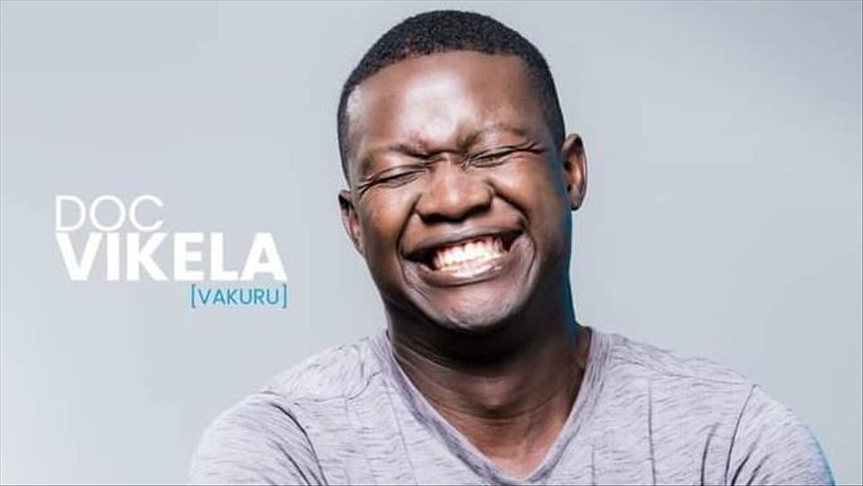Comedians standing up to 'repression' in Zimbabwe
Art and comedy take centerstage in country's political commentary
 Victor Mpofu, known commonly by his stage name as a comedian, said he uses comedy to speak out against the ills committed by political leaders in Zimbabwe. Courtesy of Victor Mpofu - Anadolu Agency
Victor Mpofu, known commonly by his stage name as a comedian, said he uses comedy to speak out against the ills committed by political leaders in Zimbabwe. Courtesy of Victor Mpofu - Anadolu Agency
MWENEZI, Zimbabwe
Despite facing "threats" of being arrested by law enforcers, comedians in Zimbabwe still attract and amuse people in towns and villages, saying serious things in a lighter way.
Comedians like 26-year-old Tonderai Zinyanga have become crowd-pullers, using the art of comedy to censure the country's governance.
Zinyanga, who is based in the Mwenezi district of the southern Masvingo province, says subtle satire makes it possible for him to speak out against policies of the government he does not approve of.
Comedy in villages
“Villagers have a good time seeing my performances, especially when I mimic politicians known to be oppressing the masses,” Zinyanga told Anadolu Agency.
During the reign of former President Robert Mugabe, Zinyanga said he used to copy the aged leader’s actions and speeches to the sheer pleasure of the audience.
“By imitating late President Mugabe, I wanted to draw people’s attention to his brutality. I still do the same about current President Emmerson Mnangagwa under whom tyranny has continued,” said the unemployed college graduate.
Mugabe died at age 95 in 2019 after ruling Zimbabwe for 37 years. He was toppled through a military coup in November 2017, and his former deputy Mnangagwa took over the reins later.
People hoped for a change but governance and economic management do not seem to have improved much.
Comedians like Zinyanga, even as he churns his satire in remote villages, have managed to draw stunning political similarities between Mugabe and his predecessor.
Many villagers in Mwenezi say they are beginning to see the light through these shows.
“Zinyanga helps us realize where we are going politically and economically. I have personally realized this because under Mugabe we experienced oppression and brutal rule. We are experiencing the same oppression today under Mnangagwa. Nothing has changed,” said 76-year-old Trynos Mahukwe, who served in the police before Zimbabwe gained independence from Britain in 1980.

Farai Monro, known by his stage name as Comrade Fatso -- also a director of Magamba Television, a Zimbabwean comedy online television network -- said as comedians at Magamba, they have become constant targets of police aggression as they speak out against political injustices in Zimbabwe. Photo: Jeffrey Moyo - Anadolu Agency
Comedians endure repression
With comedy becoming a big hit, the government is said to have not been kind with comic actors, who constantly criticize the political regime.
For 40-year-old Farai Monro, a comedian and creative director at Magamba TV, a Zimbabwean independent online comedy television network, his role is to ensure ordinary people have a voice.
“The work that we do at Magamba TV is to amplify voices speaking the truth. We speak truth to power through satire. We challenge the government using humor,” Monro, who is known by his stage name Comrade Fatso, told Anadolu Agency.
But Monro said they face pressure from officials for being outspoken. “In 2017, they arrested our Magamba TV producer. Police raided our offices, confiscated our laptops. So, the state repression is very much real and a constant thing."
Two years ago, comedian Samantha Kureya, known by her stage name Gonyeti, was reportedly abducted from her home in the capital Harare and beaten up. She was popular for being critical of police and other government departments through her comic skits.
Comedians fight for democracy, capitalize on media censure
Media experts see comedians as fighting for democracy and rule of law.
“Comedians are actually pro-democracy and pro-accountability activists using comedy as an alternative platform to convey messages on sensitive matters,” Enrst Mudzengi, director for Media Center Zimbabwe, told Anadolu Agency.
Victor Mpofu, known as Doctor Vickela, another comedian famed for mimicking President Mnangagwa, said "it is my duty to heal our community, and to challenge those in power."
According to Rashweat Mukundu, media researcher and Africa adviser at the International Media Support, a Denmark-based NGO, restrictions on press freedom have given the comedians an opportunity to fill the gap.
“By comedy, the artists and the whole society are hitting back at the ruling elite. It’s a way of socially isolating and laughing at the oppressors. So, society is essentially looking down upon them by creating all sorts of jokes and comic lines that lampoon the ruling elite,” Mukundu told Anadolu Agency.
“Art and comedy have taken a center stage in political commentary in Zimbabwe. This is mostly due to the repression of the mainstream media. So, people resort to satire to express their frustrations and concerns in a way that makes it difficult for authorities to target them."
Should not hurt, mock disability
Government spokesperson Nick Mangwana said there is nothing wrong with comedy as long as it triggers fun and laughter, without hurting others.
"You cannot make a comedy without poking fun at someone, even if it is the president; that’s the work of comedy, it has to be fun," he told Anadolu Agency. "It only cannot be fun if it then starts to, for instance, mock someone who is disabled."
Anadolu Agency website contains only a portion of the news stories offered to subscribers in the AA News Broadcasting System (HAS), and in summarized form. Please contact us for subscription options.


